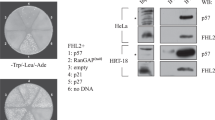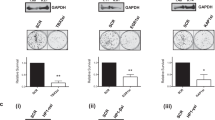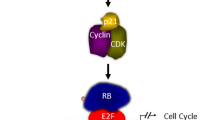Abstract
Both E2F and p53 are sequence specific transcription factors that regulate early cell cycle progression. The pathway of control mediated through E2F governs the transition from G1 into S phase whereas p53 in response to genotoxic stress can facilitate cell cycle arrest or apoptosis. The mechanisms which influence the outcome of p53 induction are not clear, although transcription of the p53 target gene, encoding the cdk-inhibitor p21Waf1/Cip1, correlates with p53-mediated cell cycle arrest. Here using a combination of biochemical and functional assays we identify p300 as a co-activator required for p53-dependent transcriptional activation of Waf1/Cip1. Furthermore, we show that the cdk-inhibitor p21Waf1/Cip1 autoregulates in a positive fashion transcription through modulating the activity of the p53/p300 complex, whilst negatively regulating the activity of E2F by preventing cdk-dependent phosphorylation of pRb. Consistent with a role for p21Waf1/Cip1 in the autoregulation of p53-dependent transcription, p300 augments the ability of p53 to cause G1 arrest and, conversely, cells undergoing p53-dependent apoptosis are rescued by p300. Thus, our data suggest that the ability of p300 to interact with p53 influences the physiological consequence of p53 activation. From previous studies it is known that cells expressing aberrant levels of E2F-1 can undergo p53-dependent apoptosis. In addition, we find that E2F-1 can cause apoptosis in p53−/− tumour cells and further p300, which also functions as a co-activator for the E2F/DP heterodimer, enhances the apoptotic activity of E2F-1. In conditions where E2F-1 and p53 co-operate in apoptosis E2F-1 can effectively compete for p300, causing a reduction in p53-dependent transcription. Thus, a functional interaction between p300 and either p53 or E2F-1 has a profound impact on early cell cycle progression, specifically in regulating the contrasting outcomes of cell cycle arrest and apoptosis. These results suggest a critical role for p300 in integrating and co-ordinating the functional interplay between the pathways of growth control mediated by E2F and p53.
This is a preview of subscription content, access via your institution
Access options
Subscribe to this journal
Receive 50 print issues and online access
$259.00 per year
only $5.18 per issue
Buy this article
- Purchase on Springer Link
- Instant access to full article PDF
Prices may be subject to local taxes which are calculated during checkout
Similar content being viewed by others
Author information
Authors and Affiliations
Rights and permissions
About this article
Cite this article
Lee, CW., Sørensen, T., Shikama, N. et al. Functional interplay between p53 and E2F through co-activator p300. Oncogene 16, 2695–2710 (1998). https://doi.org/10.1038/sj.onc.1201818
Received:
Revised:
Accepted:
Published:
Issue Date:
DOI: https://doi.org/10.1038/sj.onc.1201818
Keywords
This article is cited by
-
p53 signaling in cancer progression and therapy
Cancer Cell International (2021)
-
KSHV encoded LANA recruits Nucleosome Assembly Protein NAP1L1 for regulating viral DNA replication and transcription
Scientific Reports (2016)
-
p300 plays a role in p16INK4a expression and cell cycle arrest
Oncogene (2008)
-
Dysregulation of CREB binding protein triggers thrombin-induced proliferation of vascular smooth muscle cells
Molecular and Cellular Biochemistry (2008)
-
Regulation of epidermal apoptosis and DNA repair by E2F1 in response to ultraviolet B radiation
Oncogene (2005)



